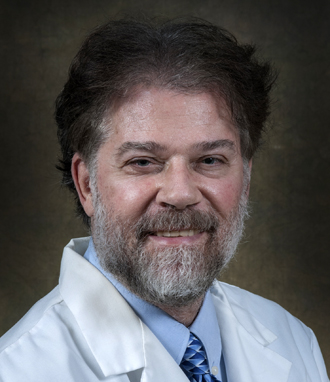A Wayne State University School of Medicine research team has found that stress decreases viral resistance and increases COVID-19 susceptibility in embryonic stem cells and their descendant cells in the yolk sac, a condition that may threaten the early embryo and lead to miscarriage or other adverse effects.
In “Stress Decreases Host Viral Resistance and Increases Covid Susceptibility in Embryonic Stem Cells,” (https://link.springer.com/article/10.1007/s12015-021-10188-w) published in Stem Cell Reviews and Reports, Daniel Rappolee, Ph.D., associate professor of Obstetrics and Gynecology and of the C.S. Mott Center for Human Growth and Development, reported that a controlled hyperosmotic stress can increase COVID-19 susceptibility and decrease viral resistance in an animal model of embryonic stem cells.

Of the 30 gene ontology groups of functionally related genes the team tested for host cell viral susceptibility under stress, 15 underwent significant changes. The reaction of four of those groups suggest that stress decreased resistance to viral attack on embryonic stem cells, whereas normal differentiation of stem cells increased viral resistance.
The research team also studied known coronavirus receptor gene expression and found Covid19/Cov2/SARS2 as well as earlier Cov1/SARS1 (2003) and MERS (2012) virus receptors increase with stress and stress-forced differentiation of embryonic stem cells in the yolk sac.
The researchers used a form of controlled hyperosmotic stress to initiate stress upon the cells. Hyperosmotic stress occurs when there are more molecules dissolved in the solution outside the cell than inside the cell, drawing fluid from the cell.
Stressors that can trigger susceptibility can be internal, or external, such as dehydration or untreated high blood sugar. Hyperosmotic stress may represent several other environmental stressors that are now being tested for their ability to make stem cells and embryos more susceptible and less resistant to coronaviruses.
The stress response can decrease embryonic stem cell viral host resistance to many other viruses, not just the virus that causes COVID-19, Dr. Rappolee said.
“Stress may increase immediate embryonic lethality and miscarriage, or long-term health effects after COVID-19 infection of cells arising from embryonic stem cells soon after fertilization,” Dr. Rappolee said. “Other stressors pregnant women are exposed to, including hormonal stress, stress of environmental toxicants, diet supplements and pharmaceuticals, should be tested.”
Stressors often do not arise one at a time, suggesting the need to test for adverse effects due to mixtures of stressors, for example hormonal stress arising inside the body and environmental toxicants coming from outside the body.
Dr. Rappolee is testing categories of potential stressors originating inside and outside the body for their effects on covid and coronavirus susceptibility and host cell resistance.
The research team included Mohammed Abdulhasan, Ph.D., University of Baghdad; Ximena Ruden, B.S., research assistant, University of Arizona; Benjamin Rappolee, Washington University of St Louis; Sudipta Dutta, Ph.D., of Texas A&M University; Katherine Gurdziel, Ph.D., of the WSU Genome Sciences Core; Douglas Ruden, Ph.D., professor of Obstetrics and Gynecology, and director of the WSU Institute of Environmental Health Sciences; Awoniyi Awonuga, M.D., professor of Obstetrics and Gynecology, and director of the WSU Division of Reproductive Endocrinology and Infertility; Steve Korzeniewski, Ph.D., associate professor of Family Medicine and Public Health Sciences; and Elizabeth Puscheck, M.D., professor of Obstetrics and Gynecology.
Student interns working towards their bachelor’s degrees or high school diplomas also contributed to this research. They include: Teya Marbens, University of Detroit Mercy, of Sterling Heights, who participated through WSU’s ReBuild program funded by the National Institutes of Health; and Tanmai Nimmagadda, Detroit Country Day School, of Northville; Syed Ali, Cass Technical High School, of Detroit; and Munsir Jabir, Cass Technical High School, of Detroit, who participated through the School of Medicine’s Biomedical Career Advancement Program.
The study was supported with funding from the National Institutes of Health (R41 ES031451, R41 ES028991) the WSU Institute for Environmental Health Sciences, the WSU Center for Urban Responses to Environmental Stressors pilot (P30 ES020957) and the Michigan Emerging Technology Fund.